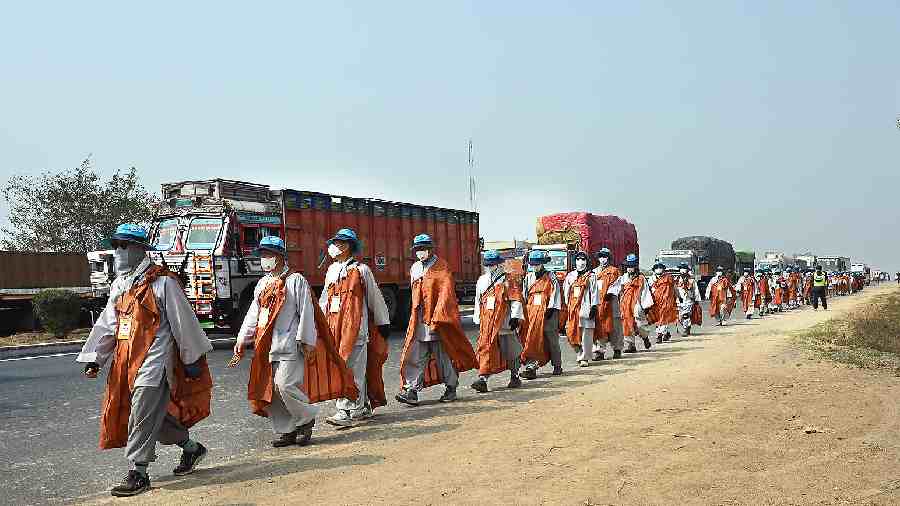Clad in white and ochre robes, with blue hats to ward off the spring sun that is getting warmer every passing day, a group of 108 Buddhist monks and devotees walked silently through Bihar’s Rohtas district on Thursday.
They are on a special 1,100km march — mostly in India and a bit in Nepal — for world peace, protection of life and love. Praying silently they moved on the National Highway-2, also known as the Grand Trunk Road, which would take them towards Bodh Gaya — the ultimate place of pilgrimage for Buddhists across the world.
Police personnel from the local police station areas accompany them.
An ambulance and vehicles carrying their tents, sleeping bags, ration and other things of daily use also tow with them.
The pilgrimage has been organised by the Sangwol Society of South Korea and the group started walking from deer park in front of the Dhamekh Stupa near Varanasi in Uttar Pradesh on February 11.
Covering around 20 to 25km daily, the pilgrims entered Bihar’s Kaimur district on February 14 and arrived in the adjoining Rohtas district on Wednesday where they pitched their tents at Chenari to spend the night.
They will arrive at Bodh Gaya on February 21, pray at the Unesco world heritage Mahabodhi Temple, and hold a religious congregation on world peace under the Bodhi Tree there the next day before moving ahead.
They will visit Nalanda, Rajgir, Vaishali, Kushinagar (Uttar Pradesh), and Lumbini (the birthplace of Lord Buddha in Nepal). The pilgrimage will end at Sravasti in Uttar Pradesh on March 23. The Union and the state governments are providing security services to the group.
The police personnel walk with them from around 2am to 10am daily and also guard them afterwards. The local administration arranges for places to camp where the chefs with the group cook Korean food.
A group of Indians is also with them acting as interpreters, translators and guides as most of the Korean devotees are conversant with neither Hindi nor English.
“We are pilgrims following in the footsteps of Lord Buddha. This is going to take 43 days. Our broader motive is to pray for world peace. If we think on a normal scale, this year is the golden jubilee year of the diplomatic relationship between India and South Korea and the bond will grow stronger through this march. The Centre has provided security to us and we are thankful for it,” Jong Ho, a monk serving as the public relations officer of the pilgrimage group told The Telegraph through one of the interpreters.











